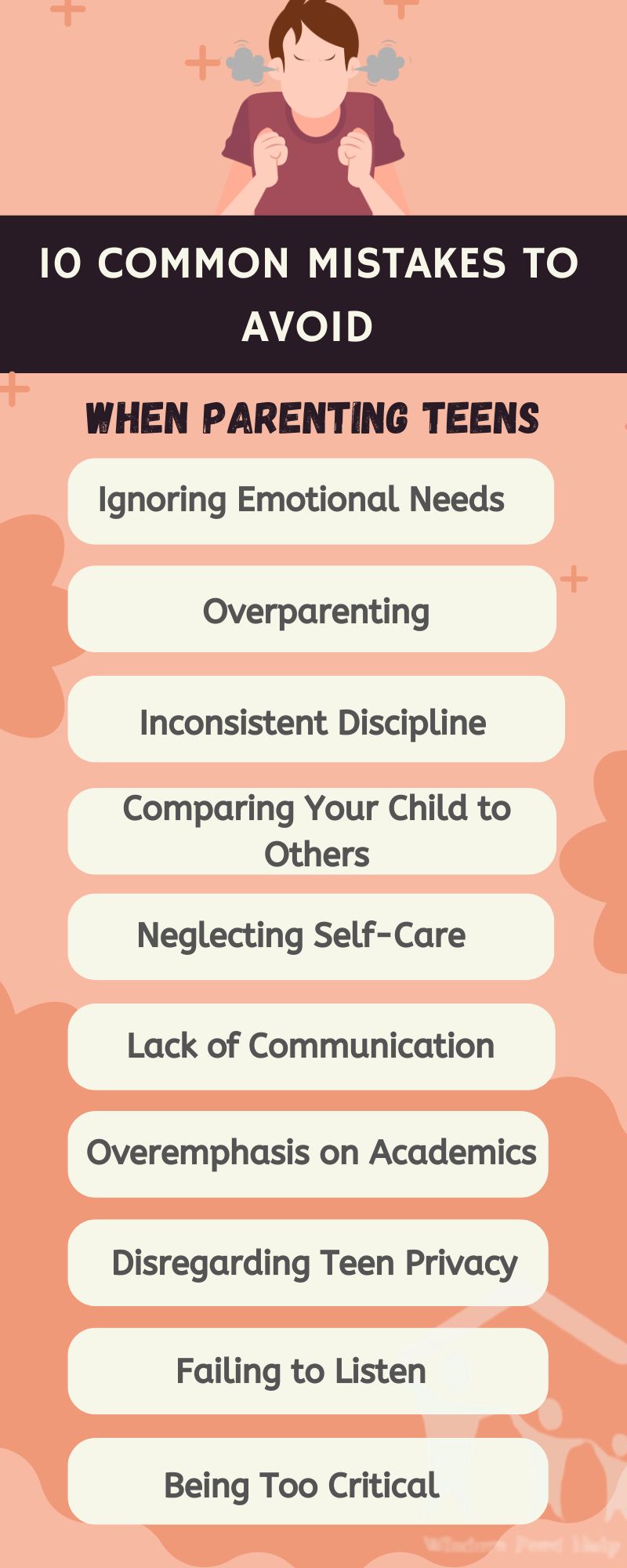Parenting teenagers can feel like navigating through a maze blindfolded – full of twists, turns, and unexpected challenges at every corner. It’s a time when hormones run rampant, communication becomes strained, and the line between independence and dependence blurs. As parents, we’re often left feeling like we’re walking on eggshells, unsure of which step might trigger a meltdown or a standoff. But fear not, for amidst the chaos lies an opportunity for growth and connection.
In the tumultuous journey of raising teenagers today, avoiding common parenting mistakes is paramount for nurturing a strong and positive parent-teen relationship. By recognizing and sidestepping these pitfalls, parents can pave the way for smoother navigation through the teenage years, fostering understanding, trust, and mutual respect along the way. So, let’s delve into the top 10 common mistakes we should avoid when parenting teens, and discover how implementing positive parenting strategies can lead to a happier and healthier family dynamic. Ready to embark on this transformative journey? Let’s dive in!
Mistake 1: Ignoring Emotional Needs
Adolescence is a hard time filled with a rollercoaster of emotions. Addressing teens’ emotional needs is paramount as it lays the foundation for healthy development and strengthens the parent-teen bond. Ignoring these needs can lead to feelings of isolation, anxiety, and low self-esteem, hindering a teenager’s ability to overcome the challenges of adolescence effectively.
For example, consider a scenario where a teenager comes home from school visibly upset after a disagreement with a friend. If the parent ignores the teen’s distress, dismissing it as trivial, it can breed resentment and diminish trust in the parent-child relationship. Similarly, neglecting to acknowledge a teen’s anxiety about upcoming exams may result in heightened stress levels and academic underperformance.
Actionable Tips:
- To support teens emotionally, parents can create a safe and nurturing environment where open communication is encouraged.
- Actively listen to your teen’s concerns without judgment, validate their feelings, and offer reassurance and guidance.
- Encourage healthy coping mechanisms such as journaling, exercise, or seeking professional help when needed.
By prioritizing your teen’s emotional well-being, you foster resilience and strengthen your relationship with them.

Mistake 2: Overparenting
Overparenting, also known as helicopter parenting, refers to a style of parenting characterized by excessive involvement and control over a child’s life. This often manifests as parents micromanaging every aspect of their teenager’s daily activities, decisions, and relationships. While well-intentioned, overparenting can have detrimental effects on teens’ development and independence.
Overparenting can hinder teens’ development in several ways. Constant parental intervention deprives teens of opportunities to learn from their mistakes and develop problem-solving skills. It fosters a sense of dependency and undermines their confidence in making decisions independently. Additionally, overparented teens may struggle to cope with failure or setbacks, as they have not been allowed to experience and overcome challenges on their own.
Actionable Tips:
- Finding a balance between support and independence is key to avoiding overparenting. Parents can start by trusting their teenager’s abilities and allowing them space to make decisions and take risks.
- Encourage autonomy by involving teens in decision-making processes and allowing them to face consequences for their actions.
- Practice active listening and offer guidance when needed, but resist the urge to intervene unnecessarily.
When parents let teens to take ownership of their lives and learn from their experiences, parents can foster resilience and self-reliance in their teenagers.
Mistake 3: Inconsistent Discipline
Consistency in discipline is vital for teenagers’ development and well-being. Clear and consistent boundaries provide teens with a sense of structure and security, helping them understand expectations and consequences for their actions. Inconsistent discipline, on the other hand, can lead to confusion, resentment, and a lack of respect for authority figures.
There are situations where a parent imposes strict consequences for a rule violation one day but overlooks the same behavior the next. This inconsistency sends mixed messages to the teen, making it challenging for them to understand what is expected of them. As a result, they may become frustrated, resentful, or even engage in risky behaviors to test boundaries.
Actionable Tips:
- Establishing and maintaining consistent discipline requires clear communication and follow-through.
- Set clear expectations and consequences for behavior, and ensure that both parents are on the same page.
- Consistently enforce rules and consequences, avoiding exceptions or leniency based on circumstances.
- Be firm but fair in enforcing discipline, and provide opportunities for teens to earn back privileges through positive behavior.
- Practice open communication with your teen, explaining the reasons behind rules and consequences and allowing them to express their thoughts and feelings.
This way parents can promote respect, responsibility, and accountability in their teenagers.
Mistake 4: Comparing Your Child to Others
Comparing teens to their peers can be detrimental to their self-esteem and overall well-being. Each teenager is unique, with their strengths, weaknesses, and interests. When parents compare their children to others, it sends the message that their worth is tied to external achievements or attributes. This can create feelings of inadequacy, resentment, and pressure to live up to unrealistic standards.
The impact of comparison on teens’ self-esteem can be profound. Constantly being measured against their peers can lead to feelings of insecurity, low self-worth, and a distorted sense of identity. Teens may internalize the message that they are not good enough as they are, leading to anxiety, depression, or even disordered eating behaviors. Comparison can also strain parent-teen relationships, as teens may feel misunderstood or unfairly judged by their parents.
Actionable Tips:
- Rather than comparing teens to their peers, parents can focus on celebrating their individuality and unique qualities.
- Encourage teens to explore their interests, passions, and talents without the pressure to conform to external standards.
- Celebrate their achievements, big or small, and provide unconditional support and acceptance.
- Foster an environment where teens feel valued for who they are, rather than what they achieve in comparison to others.
Teens can develop a strong sense of self-confidence and self-worth that will serve them well into adulthood, given, you follow the above steps.
Mistake 5: Neglecting Self-Care
Self-care is not selfish; it’s essential, especially for parents of teenagers. Parenting adolescents can be emotionally draining and physically demanding, making it crucial for parents to prioritize their own well-being. Neglecting self-care can lead to burnout, resentment, and strained relationships with both teens and other family members.
Though the importance of self-care is known, parents often face many obstacles in prioritizing their own needs. Balancing work, family, and personal responsibilities can leave little time or energy for self-care activities. Additionally, feelings of guilt or obligation may prevent parents from taking time for themselves, leading to a cycle of neglect and exhaustion.
Actionable Tips:
- Implementing practical self-care strategies can help parents replenish their energy and resilience.
- Carve out dedicated time for self-care activities, even if it’s just a few minutes each day.
- Practice mindfulness techniques such as deep breathing, meditation, or yoga to reduce stress and promote relaxation.
- Engage in activities that bring joy and fulfillment, whether it’s reading a book, going for a walk, or pursuing a hobby.
- Don’t hesitate to seek support from friends, family, or mental health professionals when needed.
Remember, prioritizing self-care isn’t selfish—it’s an essential component of effective parenting and overall well-being.
Mistake 6: Lack of Communication
Effective communication is the cornerstone of a healthy parent-teen relationship. It fosters trust, understanding, and mutual respect, laying the groundwork for open and honest dialogue. When communication breaks down, misunderstandings arise, and conflicts escalate, leading to strained relationships and feelings of disconnect between parents and teens.
Communication with teenagers can be challenging for parents. Adolescents may be reluctant to share their thoughts and feelings, fearing judgment or rejection. Busy schedules, technology distractions, and generational gaps can further hinder meaningful communication between parents and teens. Eventually, unresolved conflicts or past communication breakdowns may create barriers to future dialogue.
Actionable Tips:
- Overcoming communication barriers requires intentional effort and commitment from both parents and teens.
- Create opportunities for regular, uninterrupted communication, such as family dinners or one-on-one outings.
- Practice active listening, showing genuine interest and empathy in your teen’s experiences and perspectives.
- Be patient and non-judgmental, allowing your teen to express themselves without fear of criticism.
- Use positive communication techniques, such as “I” statements and reflective listening, to facilitate constructive dialogue and problem-solving.
- Be proactive in addressing communication challenges, seeking support from family therapists or parenting workshops if needed. By prioritizing open and honest communication, parents can strengthen their bond with their teens and navigate the challenges of adolescence together with greater understanding and resilience.
Mistake 7: Overemphasis on Academics
While academic success is important, placing too much emphasis on grades and achievements can have detrimental effects on teenagers’ overall well-being. Overemphasis on academics can lead to stress, anxiety, and burnout, as teens feel pressure to excel in school at the expense of their mental and physical health. Additionally, it may hinder teens’ exploration of other interests and passions, limiting their personal growth and development.
In today’s competitive society, parents often feel pressure to prioritize academic success above all else. High expectations from parents, teachers, and peers can create a culture of perfectionism, where teens feel they must constantly strive for top grades to measure up. Moreover, the pressure to secure admission to prestigious universities or pursue lucrative careers adds to the academic burden placed on teenagers.
Actionable Tips:
- Encourage your teen to pursue their passions and interests outside of the classroom, whether it’s sports, arts, or community service.
- Foster a growth mindset, emphasizing the importance of learning and growth rather than just grades.
- Encourage open communication about academic stressors and provide support and reassurance during challenging times.
- Help your teen develop effective time management and study skills to reduce academic pressure and promote a healthy work-life balance.
When we prioritize their overall well-being and personal interests, teens can thrive academically while also enjoying a fulfilling and balanced teenage experience.
Mistake 8: Disregarding Teen Privacy
Respecting teen privacy is essential for fostering trust, autonomy, and independence within the parent-teen relationship. Adolescents are in a crucial stage of identity development, and their need for privacy is a natural part of this process. Disregarding their privacy can erode trust and lead to feelings of resentment and invasion of personal space.
Balancing the need to protect and guide teens with respecting their privacy can be challenging for parents. Concerns about safety and well-being may prompt parents to monitor their teen’s activities closely, leading to conflicts over boundaries and autonomy. Additionally, technological advancements have blurred the lines between public and private spaces, making it difficult for parents to navigate the digital landscape while respecting their teen’s online privacy.
Actionable Tips:
- Have open and honest discussions with your teen about privacy rights and responsibilities.
- Respect their personal space and avoid unnecessary intrusion into their private lives, such as reading their texts or monitoring their online activity without their consent.
- Focus on building trust through communication and mutual respect.
- Encourage your teen to communicate openly with you about their concerns and experiences, and be receptive to their need for privacy.
By striking a balance between supervision and respect for privacy, parents can nurture a trusting and supportive relationship with their teenagers.
Mistake 9: Failing to Listen
Listening is the cornerstone of effective communication and understanding between parents and teens. It conveys respect, validation, and empathy, fostering a sense of connection and trust within the parent-teen relationship. Failing to listen to teens can lead to feelings of frustration, alienation, and resentment, as their thoughts and feelings go unheard and unacknowledged.
Busy schedules, distractions, and generational differences can pose challenges to effective listening between parents and teens. Parents may struggle to find time to engage in meaningful conversations with their teenagers amidst the demands of work, household chores, and other responsibilities. Additionally, teens may feel misunderstood or dismissed by their parents, leading to a breakdown in communication and strained relationships.
Actionable Tips:
- Active listening is essential for bridging the communication gap between parents and teens.
- Practice being fully present and attentive when your teen is speaking, setting aside distractions and showing genuine interest in what they have to say.
- Avoid interrupting or jumping to conclusions, allowing your teen to express themselves fully without judgment.
- Validate their thoughts and feelings, even if you don’t always agree with them, and show empathy and understanding.
- Create opportunities for open dialogue and encourage your teen to share their thoughts, concerns, and experiences with you.
Parents can strengthen their bond with their teenagers and foster a supportive and nurturing relationship built on trust and understanding with these steps.
Mistake 10: Being Too Critical
The way parents provide feedback and criticism can significantly impact teenagers’ self-esteem and confidence. Constant criticism can erode their sense of worth and lead to feelings of inadequacy, anxiety, and depression. Parents must recognize the power of their words and strive to provide constructive feedback in a supportive and nurturing manner.
Providing constructive criticism while avoiding negativity or harshness can be challenging for parents. Criticism may stem from a desire to motivate or improve their teen’s behavior or performance. However, excessive criticism can create a hostile environment, damaging the parent-teen relationship and hindering teenagers’ personal growth and development.
Actionable Tips:
- Balancing constructive feedback with praise and encouragement is key to fostering a positive and supportive environment for teenagers.
- Recognize your teen’s efforts and strengths, acknowledging their accomplishments, no matter how small.
- When offering criticism, focus on specific behaviors or actions rather than criticizing their character or worth as a person.
- Use “I” statements to express your feelings and concerns, and offer suggestions for improvement in a non-judgmental and respectful manner.
- Encourage open communication and be receptive to your teen’s feedback and perspective.
- Model self-compassion and empathy, demonstrating that it’s okay to make mistakes and learn from them.
By promoting a culture of constructive feedback and support, parents can help their teenagers thrive and develop resilience in the face of challenges.
Conclusion
In conclusion, navigating the challenges of parenting teenagers requires a mindful approach that avoids common mistakes. As you embark on this journey, I encourage you to implement the actionable tips provided in this article. Take the time to listen to your teen, respect their privacy, and offer support and guidance as they navigate adolescence.
Parenting teens is undoubtedly challenging, but it’s also incredibly rewarding. Embrace the journey, celebrate the successes, and remember that every mistake is an opportunity for growth and learning. Together, we can create stronger, healthier relationships with our teenagers and support them on their journey to adulthood.
As you reflect on what not to do when parenting, consider: What steps can you take to strengthen your connection with your teenager and create a more supportive environment at home?Before you leave, if you would like to read books on parenting teens and tweens, here is our article that lists the some of the best parenting books in this realm.


